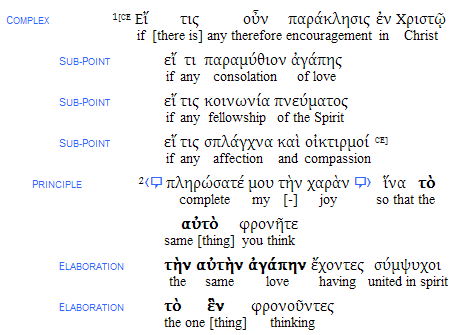I am teaching a class at church through the book of Philippians, and we were beginning chapter 2 this week. The chapter begins with a series of conditional clauses before coming to a meta-comment and command.
The questioner asked a great question: “Which ‘if’ is this in verse 1, the one that means ‘if’ or the one that means ‘since’?” You see, she was used to being taught about the different senses of the Greek words as a means of reaching an interpretation. Because there is consolation of love and fellowship of the Spirit and affection and compassion and encouragement in Christ, this could not be the “if” if, it had to be the “since” if. If it was the “if” if, then that would mean that these attributes were in question. Such a reading would open the door for these things not to be present in Christ, right?
I answered by saying that this was the if that means “if”, and that this is the basic meaning of the word. The idea of ‘since’ comes from using the conditional in a context where it is not needed. The reason she was wanting to translate the word as ‘since’ had to do with the usage in the context, not some subset of meaning inherent in the word. Paul could have re-framed these conditions as yes/no questions and brought about much the same effect. His goal was not to make us question these things, but to remind us that they are present.
Is there any encouragement in Christ? (Well, yes, I suppose there is.)
Is there any consolation of love? (Well, yes, I guess there is.)
Is there any fellowship of the Spirit? (Well, yes there is.)
Is there any affect and compassion? (Well, yes.)
Then make my joy complete…
With each “no brainer” question, the reader is forced more and more to accept whatever assertion it is that follows. It is something like me asking my kid
“Do you love your sister? Do you want her to be kind to you? If this is true, then…”
Framing patently true statements in the form of conditions has the same effect. Since there is no doubt whatsoever about the conditions being met, whatever proposition follows holds true or must be observed. By framing v. 1 in this way, Paul leaves the reader little wiggle room to avoid accepting his command. I understand the command in v. 2 to function as a meta-comment that serves to highlight the more important proposition that follows: thinking the same thing. The use of the meta-comment means that the highlighted idea is of necessity subordinated to the meta-comment. The grammatical subordination does not minimize its importance. The two participial clauses that follow serve to elaborate on what it practically means to be like-minded.
Using a conditional in a context where the content cannot be questioned brings about a certain effect. ‘Since’ is not a semantic meaning of the conditional particle. Instead it results from the use of the conditional in a context where it is unneeded. It has the effect of forcing the reader to accept what follows since the conditions are met. This illustrates the difference between the inherent or semantic meaning of a form, versus the effect of using it in a certain context. From the standpoint of discourse grammar, this effect is better explained as a pragmatic result of the context, and not as a special semantic meaning of ‘if’. This conditional particle is what grammarians have called a ‘function word’. It more serves to do or signal something, rather than to have a semantic range of mean with a word like ‘loaf’. Rick at Ricoblog has been chipping away for months now to determine the core function of ALLA, considering every instance in the NT and the Apostolic Fathers. He has indeed found the core meaning, but it took trimming off a bunch of different senses by determining what it was about the context of the usage that brought about the different effect. Generally speaking, it was the kind of rule breaking or flaunting that we see here in Philippians 2 with ‘if’.
Stephen Levinsohn uses the example of the English present progressive to illustrate the difference between semantic meaning and a pragmatic effect its use in a certain context can bring about. Saying either “It is raining” or “John is polite” does not bring about any special effect. The first describes an event that will not last (unless you live in the Pacific Northwest), while the latter describes a quality. But look what happens when you state a quality in a progressive form normally used for events:
John is being polite.
What is different here? What is insinuated by using the progressive form here? Insincerity, perhaps that John is not always characterized by this quality. Why is this? it is because what should be ascribed as a quality that is a state is instead portrayed as though it were a passing event. It is the ‘inappropriate’ usage that brings about the sense of insincerity, it is not part of the inherent semantic meaning of the progressive.
Languages follow expected patterns and rules, but not always. It is the departures from the expected norms, the breaking of rules, that brings about some of the richest discourse devices. It is the misuse of the semantic meaning that brings about special pragmatic effects in the right context.
Ah yes, grammar is a wonderful thing!


[…] worth anything. What he is doing will stand on its own. In one of his blog entries, he talks about semantic meaning versus pragmatic effect. Translators need to get their minds around […]